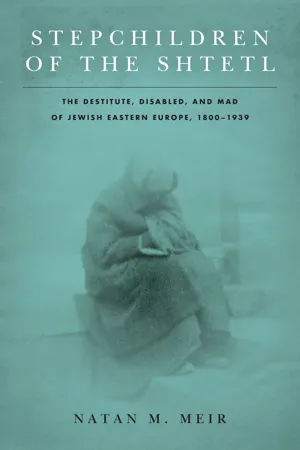
Stepchildren of the Shtetl
The Destitute, Disabled, and Mad of Jewish Eastern Europe, 1800-1939
- 360 pages
- English
- ePUB (mobile friendly)
- Available on iOS & Android
Stepchildren of the Shtetl
The Destitute, Disabled, and Mad of Jewish Eastern Europe, 1800-1939
About this book
Memoirs of Jewish life in the east European shtetl often recall the hekdesh (town poorhouse) and its residents: beggars, madmen and madwomen, disabled people, and poor orphans. Stepchildren of the Shtetl tells the story of these marginalized figures from the dawn of modernity to the eve of the Holocaust.
Combining archival research with analysis of literary, cultural, and religious texts, Natan M. Meir recovers the lived experience of Jewish society's outcasts and reveals the central role that they came to play in the drama of modernization. Those on the margins were often made to bear the burden of the nation as a whole, whether as scapegoats in moments of crisis or as symbols of degeneration, ripe for transformation by reformers, philanthropists, and nationalists. Shining a light into the darkest corners of Jewish society in eastern Europe—from the often squalid poorhouse of the shtetl to the slums and insane asylums of Warsaw and Odessa, from the conscription of poor orphans during the reign of Nicholas I to the cholera wedding, a magical ritual in which an epidemic was halted by marrying outcasts to each other in the town cemetery—Stepchildren of the Shtetl reconsiders the place of the lowliest members of an already stigmatized minority.
Frequently asked questions
- Essential is ideal for learners and professionals who enjoy exploring a wide range of subjects. Access the Essential Library with 800,000+ trusted titles and best-sellers across business, personal growth, and the humanities. Includes unlimited reading time and Standard Read Aloud voice.
- Complete: Perfect for advanced learners and researchers needing full, unrestricted access. Unlock 1.4M+ books across hundreds of subjects, including academic and specialized titles. The Complete Plan also includes advanced features like Premium Read Aloud and Research Assistant.
Please note we cannot support devices running on iOS 13 and Android 7 or earlier. Learn more about using the app.
Information
Table of contents
- Cover
- Series Page
- Title Page
- Copyright
- Dedication
- Contents
- List of Figures
- Acknowledgments
- Note on Transliteration and Dates
- Introduction
- 1. Jewish Marginal People in Premodern Europe
- 2. Blind Beggars and Orphan Recruits: The Russian State, the Kahal, and Marginal Jews in the Early Nineteenth Century
- 3. “A Pile of Dust and Rubble”: Poorhouses, Real and Imaginary
- 4. The Cholera Wedding
- 5. A “Republic of Beggars”? Charity, Jewish Backwardness, and the Specter of the Jewish Idler
- 6. Madness and the Mad: From Family Burden to National Affliction
- 7. “We Singing Jews, We Jews Possessed”: The Jewish Outcast as National Icon
- Epilogue
- Conclusion: Jewish Intersectionality at the European Fin-de-Siècle
- Notes
- Selected Bibliography
- Index
- Series List